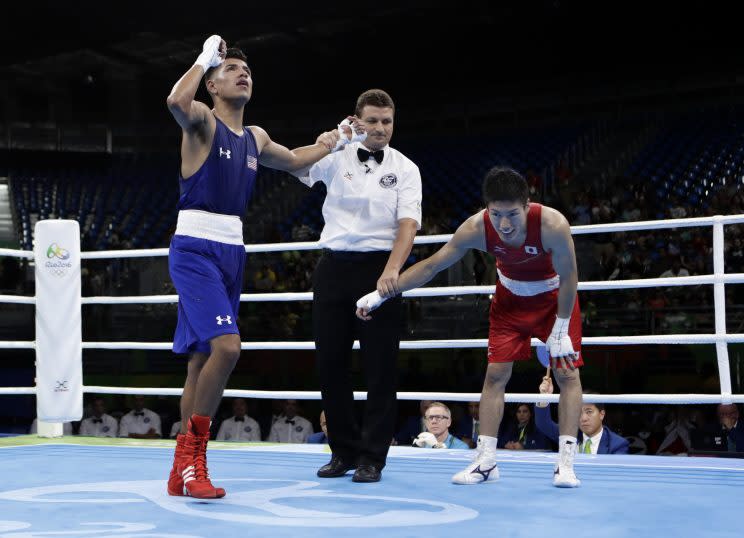Carlos Balderas keeps U.S. boxing rolling, but true test lies ahead


Iron Lady wins in an upset | King wins battle of USA vs. Russia | Murphy sets Olympic record
RIO DE JANEIRO — It’s early in Billy Walsh’s tenure as the U.S. Olympic boxing coach. And it’s even earlier in these 2016 Games. But if there is anything to be culled from the team’s first four bouts, two wins apiece by light flyweight Nico Hernandez and lightweight Carlos Balderas, it’s that they won’t hesitate to work the body.
Balderas won his second consecutive bout Tuesday with a decisive unanimous decision victory over Japan’s Daisuke Narimatsu. Judges had it 30-27 twice and 29-28 for the American, who controlled the action with his speed and relentless body assault.
Walsh, who fought for Ireland in the 1988 Olympics and was hired by USA Boxing in November to resurrect a moribund U.S. program, said his teachings reflect his experience as a fighter himself.
“Different coach,” Walsh said, chuckling, when the Americans’ persistent body work was noted. “It was clear to be seen. Everybody could see it. The whole crowd. ‘Whoa!’ And you know what? I’ve been on the receiving end of a few of those shots, so maybe that’s why I teach it. It really sinks in to the soles of your boots.”
Narimatsu fought out of a crouch with his hands very high near his head. He moved forward most of the fight, but he ate a number of hooks and uppercuts to the midsection for his trouble.
But Balderas also mixed in a jab and a strong right hand. The straight right wasn’t as much of a factor early in the fight as it was in the third, when the toll of the body shots forced Narimatsu to bring down his guard.
Balderas also demonstrated the ability to adapt and adjust, which is becoming another increasingly obvious characteristic of the American team under Walsh’s leadership.
“He was very, very awkward,” Balderas said of Narimatsu. “He would fight with his head a little more forward of his body. Every time I tried to hit to his head, he’d wait and was countering it. So what I started doing was, I started feinting a lot like my coach told me.
“I also started using my speed a lot more because he was a lot slower than me.”
Balderas now moves into the quarterfinals, where he’ll face a much more difficult task. He’ll meet top-seeded Cuban Lazaro Alvarez, who made easy work of Italian Carmine Tommasone in Tuesday’s first bout.
Tommasone is 15-0 as a pro, but he was never in the fight. Alvarez flummoxed Tommasone with his footwork and had him stumbling off-balance frequently, when he’d take advantage with sharp counters.
It’s going to be a huge challenge for the 20-year-old Balderas, particularly given the stakes. A win over Alvarez would guarantee Balderas a medal, as anyone reaching the semifinals gets at least a bronze. Walsh, though, prefers never to look ahead, even when the matches are set.
The Olympics are a pressure-packed affair and he doesn’t want to add any pressure on his fighters if he can help it.
“The big ones are coming,” he said. “The hard ones are coming. I know the guy well. I had a guy [John Joseph Nevin] who beat him in the Olympic semifinal in London, so I know him well.
“We’ll do what we normally do, which is to enjoy today. That’s win in the Olympic Games. But we’ll worry about him [Wednesday]. We’re going to enjoy the day. Carlos is going to cool down now … and [Wednesday] we’ll think about the guy. We don’t need any more tension than needs to be there.”
Balderas, though, seems as cool and relaxed as can be. The only time his emotions seemed to get to him came during the break between the second and third rounds.
He believed he hurt Narimatsu with a right hand late in the second and could barely contain himself on the stool during the break. He was eager to get out and finish the job.
“I was very anxious to get back into the ring because I noticed I had wobbled him at the end of the second round,” Balderas said. “He was still a little wobbly, but the guy can take a punch. He was very, very physically strong. He kept eating my punches.”
It’s on now to compete with, as Walsh calls them, “the big boys.” But Walsh’s rebuilding project has clearly taken hold.
It’s a long way from where the U.S. typically is, or wants to be, and despite four wins in their first four tries, the American boxers still aren’t guaranteed a thing.
They don’t give out ribbons at this point, as Walsh is fond of saying.
There’s hope, and if the truth would ever be told, that’s more than anyone with Team USA could possibly have dreamed of when Walsh was hired last year.
He’s clearly made a difference and injected spirit and confidence into his fighters.
The Americans still have a long way to go, but it’s worth noting the amount of ground they’ve already covered.



